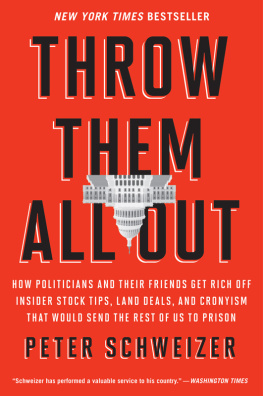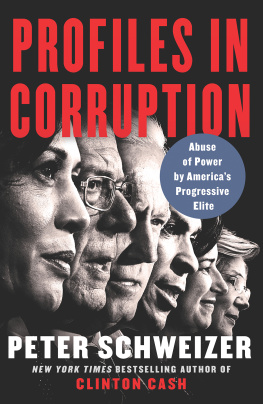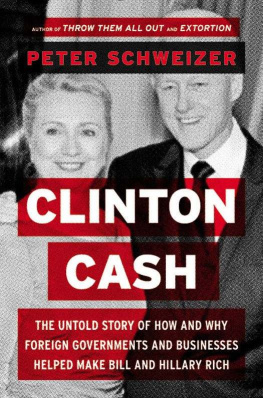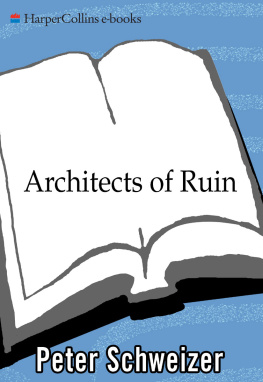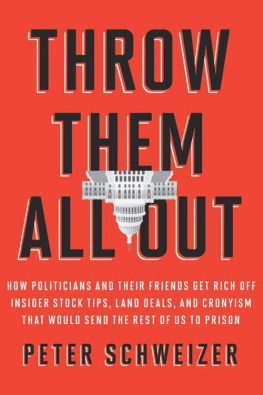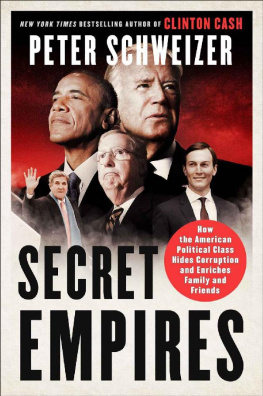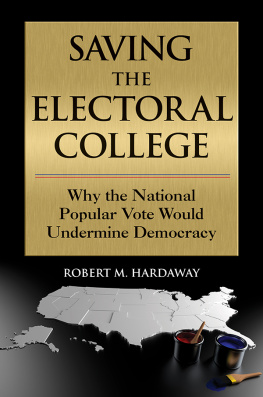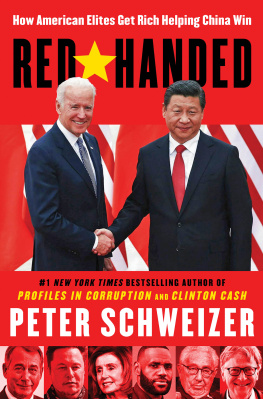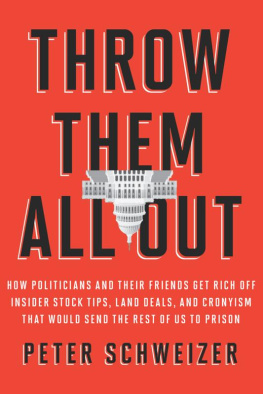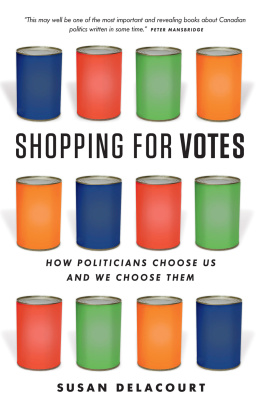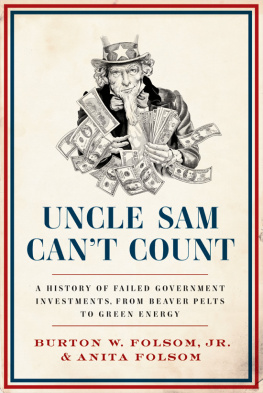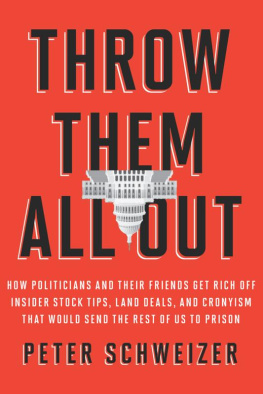Copyright 2013 by Peter Schweizer
All rights reserved
For information about permission to reproduce selections from this book, write to Permissions, Houghton Mifflin Harcourt Publishing Company, 215 Park Avenue South, New York, New York 10003.
www.hmhco.com
The Library of Congress has cataloged the print edition as follows:
Schweizer, Peter, date.
Extortion : how politicians extract your money, buy votes, and line their own pockets / Peter Schweizer.
pages cm
ISBN 978-0-544-10334-4
1. Political corruptionUnited States. I. Title.
JK 2249. S 34 2013
320.973dc23
2013026342
e ISBN 978-0-544-10330-6
v1.1013
To
Bernadette Casey Smith and Owen Smith
with humble thanks for their friendship, support, encouragement,
and wisdom over the years
Introduction
Throw Fear
Youre only as good as your last envelope.
SILVIO DANTE , The Sopranos, 1999
T HE POTOMAC RIVER that snakes by Washington, D.C., was given its name by the local native Americans centuries ago. Potomac was the name of a local tribe. According to some accounts, the word means the place where goods are off-loaded, or the place where tribute is paid. As journalists say, that latter meaning is a fact too good to check.
It is often said that money is corrupting politics. And as ever, this is true. Outside interests, from labor unions to large corporations, are influencing and distorting our government in the search for favorable policies. And these interests are well prepared to push money and special favors into Washington, D.C., in order to get them.
But a deeper, more sinister problem that has been overlooked better explains the dismal state of our national government: politics is corrupting money. While we have focused on the power that contributors have over officials, we have largely ignored the power that officials have over contributors. We have focused on the buyers of influence (those outside special interests), but paid little heed to the sellers of influencebureaucrats and politicians.
In short, we have come to believe the problem in Washington is a sort of legalized bribery. If outside interests can only be held at bay, we can and will get better leadership.
But what if we are wrong? What if the problem is not bribery... but extortion? What if the Permanent Political Class in Washington, made up of individuals from both political parties, is using its coercive public power to not only stay in office but to threaten others and to extract wealth, and in the bargain pick up private benefits for themselves, their friends, and their families?
What we often think of as the bribery of our national leaders by powerful special interests in Washington may actually make more sense understood as extortion by government officialselected and unelected. Far from being passive recipients of money and favors, they make it happen. They leverage their positions to shake the money tree for themselves and their political allies. And as we will see, they do so using a variety of methods, many of which you probably have never heard of before.
The assumption is that we need to protect politicians from outside influences. But how about protecting ourselves from the politicians?
Journalists and academics look at politics through a mythical lens that harkens back to Aristotle and Plato: politics is the business of producing correct policies. We may dispute what is correct, but in the traditional view, that is the goal of the process. Media reports on government actions, whether debates, legislation, or regulation, almost always present them in terms of pure policy. New laws are for a specific purpose, perhaps even a noble one.
But what if that isnt the real point of the exercise? What if politics is really largely about fund-raising and making money? The commercial motives of the Permanent Political Class in acting or not acting are rarely questioned and virtually never fully understood.
Popular culture takes the same naive approach. We all love the image of Jimmy Stewart in Mr. Smith Goes to Washingtonthe idealistic new senator seduced and targeted by powerful outside interests. Lost causes are the only ones worth fighting for, Stewarts character says as he fights the lobbyists and the political machine. Virtually every new candidate for office runs as an outsider, vowing to take on special interests. If only he can resist those outside forces, everything will be okay. When bad things happen in Washington, we assume the problem is that our national leaders have given in to seductive outside forces, the special interests. From time to time we erect laws and rules to protect politicians from these temptations.
But what if we have it backwards? What if the greater culprits are inside the halls of power in Washington rather than on the outside?
Some at the heart of Washington power have hinted at this cold, hard reality. As Edward Kangas, former global chairman of Deloitte Touche, put it: What has been called legalized bribery looks like extortion to us.... I know from personal experience and from other executives that its not easy saying no to appeals for cash from powerful members of Congress or their operatives. Congress can have a major impact on business.... The threat may be veiled, but the message is clear: failing to donate could hurt your company.
Former Microsoft chief operating officer Robert Herbold told me, Youre crazy if you dont play along. They will go after you. Ray Plank, the founder and former chairman of Apache Corporation, has seen his company cough up to both parties for fifty years.
Politics in modern America has become a lucrative business, an industry that has less to do with policy and a lot more to do with accessing money and favors. As we will see, bills and regulations are often introduced not to effect policy change, but as vehicles for shaking down people for those money and favors. Indeed, the motive on both sides often has nothing to do with creating a correct policy, but instead is often about maximizing profits.
Raising campaign money is not just about winning elections and staying in power. As we will see, the Permanent Political Class has come up with all sorts of creative ways to transfer those funds into other pockets, which can be accessed to enhance their own wealth and lifestyle. And they have carved out convenient loopholes in the law that allow lawmakers to legally convert votes into cash.
The same goes for lobbying. Hiring a lobbyist aligned with a powerful politician is more important than hiring a lobbyist with a certain expertise or experience. Hiring a former staff member or family member is better still. Its the favor that matters. Sometimes such favors are requested by politicians. Other times they dont need to ask out loud. Several powerful politicians have multiple members of their immediate family (spouses and children) who make big money from lobbying.
Over the course of American history there have been repeated attempts to restrict the flow of money going into political parties and campaigns. Contrary to what you might have been told in school or by the media, the advocates of these efforts have not just been good-government, public-spirited citizens. They have also been corporations and individuals tired of being shaken down.
At the turn of the twentieth century, extortion was a widespread problem in Washington. The method was perfected by Mark Hanna, who served as President William McKinleys chief fund-raiser. (Hanna once famously said, There are two things that are important in politics. The first is money and I cant remember what the second one is.) Issuing a blunt warning to large businesses, Hanna gave them an assessment, an invoice of sorts, that they were expected to give to the Republican Party. If they failed to pay it, they would face big trouble. Standard Oil was assessed a $250,000 fee. Banks were expected to pay a fee of 1 percent of their capital. By 1900, when McKinley was up for reelection, the White House was able to shake down the business community for $2.5 million (over $67 million in 2012 dollars). It sounds relatively small by todays hyperbloated standards, but at the time it was huge.
Next page
